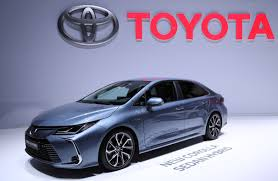Toyota (TM) stock is climbing higher on the back of upbeat guidance and the Japanese giant’s plans to set up a wholly-owned EV unit in China.
Toyota, the world’s largest automaker, reported fiscal third quarter revenue of 12.39 trillion yen ($80.95 billion), up 2.9% to despite lower vehicle sales. Net profit came in at 2.19 trillion yen ($14.21 billion), up 62% from a year earlier and topping estimates of around 1.17 trillion yen .
Due to “strengthening earnings power” and “product competitiveness,” among other things, Toyota said it now sees full-year fiscal 2025 profit of 4.7 trillion yen ($31 billion), up from its prior outlook of 4.3 trillion yen. Per Bloomberg, the street was expecting 4.8 trillion yen.
Toyota’s ADR stock trading in New York climbed nearly 4% in early trade. In its presentation, Toyota did not mention the effect of possible tariffs from the Trump administration on its results. Though Toyota makes a number of vehicles in the US, it also makes it midsize pickup, the Tacoma, in Mexico.
Toyota, the world’s largest automaker, reported total retail vehicle sales of 2.92 million, down around 1.5% from a year ago.
Toyota’s plans for China include establishing a wholly-owned company for the development and production of Lexus EVs as well as batteries in Shanghai. Production is expected to start in 2027, with an annual production capacity of 100,000 EVs.
“Local Chinese members will take the lead in planning and developing BEVs that match the unique needs of Chinese customers,” Toyota CFO Yoichi Miyazaki said in a statement. China is the world’s largest EV market, which saw 40% sales growth in 2024 alone.
Toyota’s upcoming Lexus EV plant is only the second wholly foreign-owned auto factory in China — the other is Tesla’s (TSLA) Giga Shanghai. Toyota’s other operations in China are joint ventures with local automakers.
Sticking with EVs, Toyota said it has opened its $14 billion US battery plant in North Carolina. The Toyota Battery Manufacturing North Carolina (TBMNC) is the company’s first in-house battery factory outside Japan and will produce batteries for its hybrid and fully electric vehicles sold in the US. The plant will eventually hire 5,000 new workers, and the first battery packs will ship in April.
Toyota’s plan to localize production of its EVs with both China and the US insulates the company from trade-related restrictions such as tariffs and keeps production costs lower. The question is, at least in the US, will demand for EVs continue to grow with incentives like tax credits at risk?



